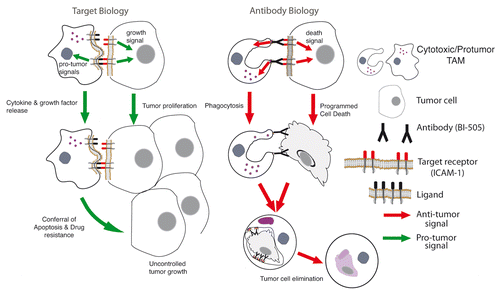Figures & data
Figure 1. Antibodies may exert antineoplastic activity by altering the biological functions of their targets and/or by mediating (direct or immune system-dependent) tumoricidal effects. In the absence of specific antibodies (e.g., BI-505), receptors (e.g., intercellular adhesion molecule 1, ICAM1) can be normally activated and transduce tumorigenic signals, hence promoting the proliferation of malignant cells and favoring their resistance to chemotherapy-induced cell death. Conversely, malignant cells coated by BI-505 not only cannot receive ICAM-1-transduced signals and undergo cell death, but also attract Fcγ receptor (FcγR)-expressing macrophages that mediate the phagocytic clearance of their corpses.
